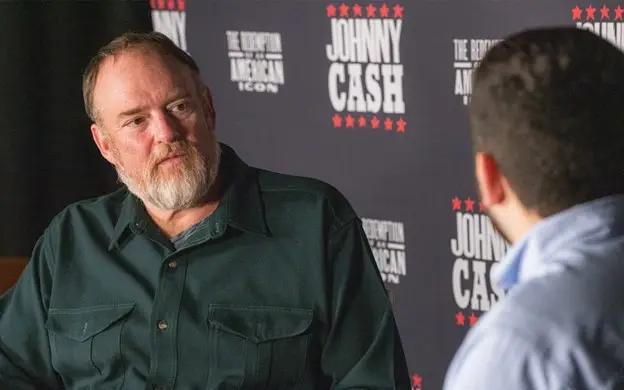John Carter Cash, son of late country music star, Johnny Cash, talks with BP reporter Timothy Cockes. Photo by Timothy Cockes.
NASHVILLE (BP) – “Johnny Cash: The Redemption of an American Icon,” is a new documentary telling the story of how the legendary musician known as “The Man in Black” found the light of Jesus Christ.
The film releases next week as a special Fathom Event showing in theaters Monday through Wednesday (Dec. 5-7).
It is directed by Ben Smallbone, brother of award-winning musical duo ‘for KING & COUNTRY” and CCM artist Rebecca St. James.
The project uses a combination of archive footage and recordings of Cash, along with interviews with his friends, family members, fellow country musicians and evangelical leaders.
Those featured in the movie include Tim McGraw, Sheryl Crow, Marty Stuart, Franklin Graham, Greg Laurie, Cash’s sister Joanne Cash and Cash’s son John Carter Cash.
John Carter Cash told Baptist Press that even though it was often overlooked, his father’s Christian faith was always a priority for him.
“His faith was essential to him all throughout his life,” Cash said in an interview.
“The defining factor of his life was his faith. His faith and connection to God was there no matter what he struggled with or endured. His faith survived out of grace. He was not perfect, but his ability to continue on is what really stands out.”
The movie tells the story of Cash’s early faith roots growing up in Arkansas, and singing gospel songs while helping work in the family fields. The younger Cash even described gospel music as the music his dad enjoyed the most.
Yet, as Cash began his music career as a young adult, he began to shift to the country music style he became known for. Despite achieving immense music success over several years, Cash dealt with a host of struggles, including a crippling drug addiction and a troubled first marriage to his wife Vivian, whom he divorced in 1966.
These were in addition to Cash’s difficult relationship with his father and the accidental death of his teenage brother Jack, who had desired to become a preacher.
All of these struggles drove Cash to a place of desperation and hopelessness. Things reached a breaking point when his addiction was at its worst in the late 1960s.
The movie tells the story of Cash walking through a dark cave in Tennessee with a flashlight, considering ending his life. At one point Cash walked as deep as he could into the cave, and dropped his flashlight and went to the ground.
Though he was in complete darkness, the story goes that the light from outside of the cave slowly started to peek through, showing him the way out.
The story represents Cash coming back to the light of Christ and the foundation of his Christian faith.
Soon, he began finding ways to bring his faith more prominently into the national spotlight. He filmed a documentary with his second wife June Carter Cash in Israel (“Gospel Road: A Story of Jesus”). He wrote a novel about the apostle Paul (“Man in White”). And he appeared at 30 crusades held by world-renowned evangelist Billy Graham.
Graham and Cash were good friends, said John Carter Cash, who described their relationship as being “like brothers.”
In addition to Cash’s public displays of faith, the younger Cash was able to see the personal side of his dad’s faith in a tangible way.
“I think one of the greatest spiritual disciplines he had was studying the Scriptures to better understand what the ways of the Spirit were,” John Carter Cash told BP. “My dad was forever a life student. He was always reading, studying and trying to understand more about life and faith.”
Toward the end of his life, Johnny and June Cash attended First Baptist of Hendersonville, Tenn.
John Carter said many people helped his dad break his drug addiction and prioritize God, but he believes he would have found his way back to God no matter the circumstance.
“His faith was his salvation and why he was alive,” the younger Cash said.
“That’s how he made it. My dad was always grateful to be here. He always took in God’s grace because by his own means, he probably wouldn’t have been here. He stayed true to what he believed in. His faith was the central focus no matter what he went through in life.”
John Carter Cash hopes the movie will paint a picture of his father’s vulnerability in a way that audiences resonate with.
“My father had a way of showing his humanity and showing his weaknesses,” he said. “He was there to support people who were also going through struggles like he went through. My dad was not afraid to say, ‘I have fallen and gotten back up. Please help me and I will help you.’ That’s the person that he was.
“There are things within this movie that I believe will lend the viewer a better understanding of my father as a human. I hope they learn what was really important to him and who he was on the inside, particularly about the beauty of his character and strength of his love.”
In a world full of technology and division, his father’s message would be to focus on what’s really important, John Carter said.
“If he were alive today my dad would say, ‘Don’t forget what really matters,’” he said. ‘“Family, connection and togetherness matter. Don’t forget what is true. Don’t let all of the information that is out there confuse what matters in the end.’
“I hope through this film, people who are struggling or feeling like they’re not connected with God can find that connection just as my father did.”
This article was written by Timothy Cockes, Baptist Press reporter, and originally appeared at baptistpress.com

